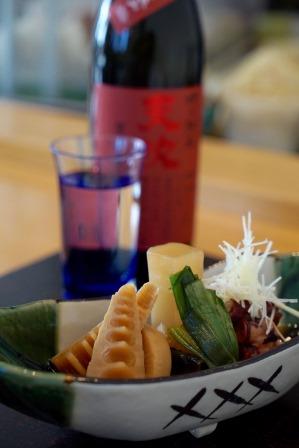
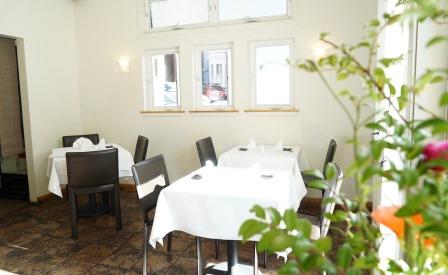
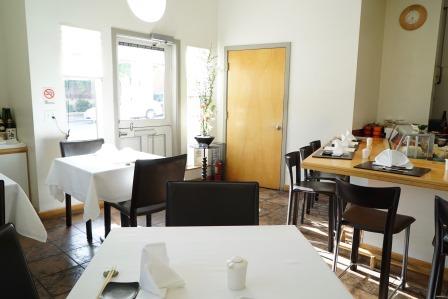
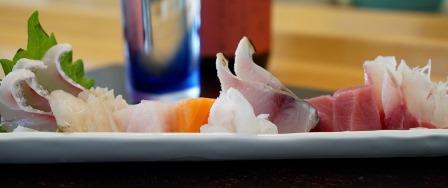
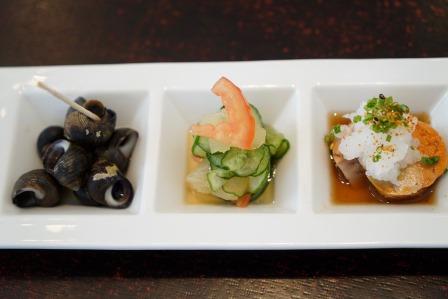
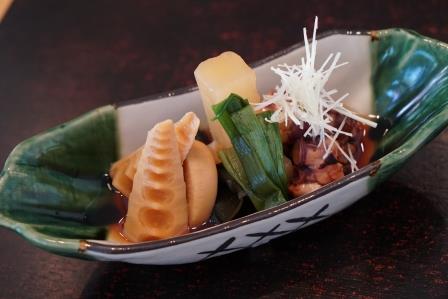
Preserving pure and unchanging Japanese cuisine
By Elli Sekine
“Kiss Seafood” is located in a corner of a building which is not very easy to spot from the main street of Japan Town. No sigh is up outside, so hardly anyone will notice there is a restaurant there. There are only ten seats, and the space looks more like a coffee shop. The interior is almost white, and is clean and bright. The seasonal fresh flowers and plants illuminated by the light from the high ceiling gives a comfortable dining ambience to the space. This small place is actually a pioneer of introducing Omakase-style menus in the San Francisco area, and has been a kind of hidden gem to the regular customers and business people over the last 16 years.
“Kiss” was opened 16 years ago by Mr. Takao Nakagawa, the owner/chef, who wanted to have a place where he could enjoy full control of operations. That was what I heard from him during my first interview with him 14 years ago. Before that, Mr. Nakagawa had worked for a long time in a Japanese restaurant, and reached the point where he wanted to open his own place to serve pure traditional Japanese cuisine. Back then, in S.F., Americanized sushi and rolls were being developed, and fusion Japanese cuisine was popular among the high-end customers. However, “Kiss” kept the traditional way. The dashi was made by konbu and katsuo, and complementary small appetizers, a-la-carte dishes, sushi, and an Omakase-style traditional Japanese menu was served. In recent years, the high-end Japanese restaurants where traditional Japanese cuisine is served are very popular. The word, Omakase (chef’s special menu), has become a Japanese American term, and is used widely. I asked Mr. Nakagawa how he felt about this phenomenon. He said, “I did not care at all about the trend back then. I was just offering the kind of menu that I, as a Japanese chef, was supposed to”. In the meantime, more and more Japanese food was introduced, and at the same time, the Americans developed their taste for it, which resulted in their recent appreciation for more traditional Japanese cuisine. “Kiss”, which once seemed un-trendy, was actually the pioneer for the modern world.
The place actually doesn’t feel small once you sit down at the counter. It is because Mr. Nakagawa who values communication with the customers has applied the ideal height and depth of the tables, lighting that makes food look pretty, etc. into his design for the place. This well thought-out comfortable distance between the guests and the chef results not only in good conversations, but conveys the chef’s craftsman spirit. Guests can see the ingredients and how they are cooked from where they sit. The number of dishes that are mainly fish in the menu is not a large amount, and10 seats/2 rotations a day, 20 meals in total allows him to manage to get the right amount of food ingredients daily. He is particular about the seasonality, and pre-orders seasonal fish ingredients. “Daily Special” menu I had included 5 selective fresh fish dishes, and tender octopus was used in the sashimi, and a nimomo dish with bamboo shoots. Every ingredient had the perfect texture, and you can really enjoy each flavor. Two Omakase menus (priced at $60 or $78) depend on the sushi or sashimi ingredients. Other popular dishes besides sushi and sashimi are “Hamachi-kama or Tai-snapper collar Misozuke and vegetable cooked in broth)” ($7.50), “Chawan Mushi (eggs, vegetables and seafood steamed in broth) ($6.50), etc. The a-la-carte dishes are cooked in the traditional Japanese style, and lightly flavored to effectively enhance the natural flavor of each ingredient. They also carry more than 40 different brands of premium sake for pairing with those wonderful traditional dishes. Some of those sake brands are from well-known very rare and small breweries.
In San Francisco, there has been a big spike of commodity prices and rents in the past several years due to the IT industry bubble burst, and the minimum wage has also increased all over California. Many of the restaurant owners in the area are heavily affected by it; however, this shop has not raised the prices of most of the dishes from 16 years ago. Most of the other places charge at least $100 for an Omakase menu, so it is rare to find a place where you can pay only $60 for an Omakase menu with 5 dishes. How can they not get affected by the spike? The answer is that it is a husband and wife only operation. They were able to purchase the property at the right time, and started the business at a minimal investment. Their unchanging tastes and business operating system have overcome the global financial crisis, and allowed them to maintain the stable operation until this day. Their way of operation is not the only thing that has not changed. They still take reservations only by phone whereas everybody else uses the internet. They believe that it helps to judge the characters of the customers by the voice. This way, they rarely experience cancellation without notice. Still no sign outside, and with no advertisement, this little place seems to have won a status of a rare secret hiding place for many of their customers.
Such an operation system where the owner can have full control in a small scale restaurant may be the ideal way. You cannot expect a huge profit, but on the other hand, can be more resilient to overcome the ever-changing economy. I asked him about his prospects and dreams for the future. He said, “I would like to continue until I reach the targeted age as long as I keep my health.” I felt warm feelings by watching him enjoying the conversations with the regular customers, explaining to them about the cooking over the counter.
変わらない、純和食を守り続ける
ジャパンタウンのメインストリートから外れた目立たない建物の一角に「Kiss Seafood」はある。外に看板もなく一見レストランと気づく人は少ないだろう。たった10席の小さなカフェのようなサイズ。店内は明るく清潔で、白を基調とした壁飾られた季節の樹木や花が高い天井からの採光が受け、居心地の良いダイニングを作り上げている。実はこの小さな店、SFで「オマカセ」メニューを始めた先駆者的な存在で、16年間常連客やビジネス客を魅了している”隠れ家的”名店なのだ。
「KISS」は16年前、オーナーシェフの中川孝雄氏が「自分が管理できる小さな店を楽しみながら経営したい」と始めたもの。私が同氏に初めてインタビューをした14年前に聞いた言葉だ。それまで長年務めた日本食レストランでの経験を経てたどり着いたのが、氏の創作料理ー純和風だった。当時SFでは、アメリカナイズされた寿司やロールメニューがバラエティを極め、ハイエンドではフュージョンがもてはやされた時代。そんな中、「Kiss」は、昔ながらの手法で昆布と鰹で出汁をとり、先付け、一品、寿司、オマカセの伝統的な和食を出していた。しかし現在SFでは、その伝統料理を提供するハイエンドレストランが人気和食店の上位を占めている。「オマカセ」という言葉も英語になり、方々で出回っている。その事に関して中川氏は、「当時は流行なんて全く考えませんでしたし、和食シェフとして当たり前のメニューだと思っていました」。結局、日本食の種類が増えると同時にアメリカ人の舌も肥え、伝統和食の良さがここにきて認められている。一見時代遅れに見えた「Kiss」は実は時代の先駆けだった。
カウンターに座ると結構広々としている。この設計は、コミュミケーションを大切にしている中川氏が、客との目線やテーブルの高さや、深さ、食べ物が綺麗に見えるライティングなどを考慮しデザインした。客との対話以外にもシェフの職人スピリットが伝わって来るこの距離感が良い。食材や調理法が目の前で見える特等席だ。魚に特化した同店のメニューの品数は多くない。1日10席2回転、全20食分。ネタも予想がつくので丁度使いきれるくらいに調整できる。中川氏のこだわりは季節に敏感であること。旬な魚はプリオーダーで調達している。「今日のスペシャル」は新鮮で活きの良い魚のセレクト5品。今日は柔らかいタコを使った料理が刺身とタケノコと一緒に煮物に使われていた。どれも具材の柔らかさが完璧で、季節の風味をたっぷり味わえる一品だ。5、6品を組み合わせたオマカセは2種類($60、$78)で寿司や刺身のネタで値段が違う。人気メニューは刺身、寿司以外アラカルトでは、ハマチや鯛のカマ味噌漬け($7.50), 茶碗蒸し($6.50)など。一品料理はどれも割烹風で食材を活かした薄味。そんなメニューに合うプレミアムな日本酒も40種類以上揃えている。中には珍しい小さな酒蔵の銘酒もある。
SFではこの5、6年、ITバブルの影響で物価、家賃が急騰し、最低賃金はカリフォルニア全体で上がり、レストランオーナー達は悲鳴を上げている。しかし同店は驚いたことに16年前からメニューの値段をほとんどあげていない。最近では「Omakase」コースであればどこも$100以上取るレストランが多い中、同店のように$60で5コース食べられる店は探しても少ないはず。物価の影響を受けていないという事だろうか? 答えはご夫婦二人だけの家族経営にあった。良い時代に物件を確保し、最小限で店を始めた結果、それが功を生じている。変わらない味、変わらない経営体制は、リーマンショックにも耐え、今でも安定した経営を持続させている。変わらないのは経営だけではなく、デジタルの時代に予約も電話のみ。相手の声を聞く事で客層も把握でき、連絡なしのキャンセルもほとんどないとか。未だに広告も看板もないが、そんな店が今では”隠れ家的存在”として、希少価値を上げているようだ。
全てコントロールできる小規模なレストランは、オーナーにとって理想の経営なのかもしれない。大きな収益は望めないが、激変する時代を乗り越える持久力がある。「これから将来の夢や希望などは」?という私の質問に、「健康な限り目的の年齢に達するまでは頑張りたいと思っています」と同氏。今日も常連客とカウンターで会話をしたり、料理を説明したり和やかな雰囲気が店全体に広がっていた。
Kiss Seafood
1700 Laguna St, San Francisco, CA 94115, United States
Phone: +1 415-474-2866
Open 5:30 pm – 9:30 pm, Wed - Sat
http://kissseafoodsf.com/